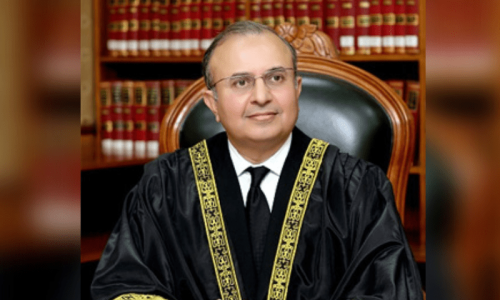
KARACHI: The launch of a book titled How Pakistan Got Divided by Maj Gen Rao Farman Ali Khan generated an engaging discussion in the latter half of the second day of the 8th Karachi Literature Festival at the Beach Luxury Hotel.
Journalist Ghazi Salahuddin, who moderated the launch, said that the book was important on a couple of counts. First, it’s relevance in the context of the 70 years of the country’s independence, and two, because it’s a subject we didn’t talk much about.
Shafiqur Rehman, son of the late author, said that the disintegration of East Pakistan was a great tragedy of our time. It could’ve been prevented had wisdom prevailed over passion. He hoped that we would learn from the mistakes of the past and never repeat them.
Scholar Ilhan Niaz said in his analysis that the author did not spare anybody, least of all the military. Gen Yahya Khan bore responsibility for the decisions made or could have been made. The writer was also unsparing of the criticism of the leaders of the two major political parties, Zulfikar Ali Bhutto (Pakistan Peoples Party) and Sheikh Mujeebur Rehman (Awami League).
Mr Niaz said the book offered insights into the military planning that took place in the run-up to war with India and led to the creation of Bangladesh. The interesting thing was that the author himself had proposed that Pakistan needed to come up with independent defence of East Pakistan. Even after the 1965 war the military leadership thought that the defence of the east lay in the west. The author was searing in his criticism of the military leadership in East Pakistan which he felt did not treat East Pakistanis as citizens to be eventually reconciled.
The book, Mr Niaz said, shed light on some of the longer terms causes of cessation of East Pakistan. The total alienation of East Pakistanis during the military rule of Gen Ayub Khan was what got the disintegration process started. On the external front India loomed largely, ever ready to exploit Pakistan’s difficulties.
Reacting to Mr Niaz’s comments, Mr Salahuddin said people seemed to be in denial about East Pakistan, a subject not yet fully explored.
Another panelist, Aquila Ismail, countered the arguments thus far given by saying that historians looked at things in an incomplete manner and did not see what happened to humanity. She said she herself was a survivor of the East Pakistan tragedy. She was at a university which was attacked on March 25.
Ms Ismail said the perception in East Pakistan was that Gen Rao (author) himself was calling the shots. One of the major aspects of his tenure was that he made the devil’s pact with the Jamaat-i-Islami which created the Al Badar and Al Shams brigades. There was brutal murder of intellectuals, and there was complicity of the general in that as well. Those perceptions were not discussed in the book and it did not offer her any comfort, she said.
Former diplomat Zafar Hilaly said the book was a good read, had a certain ring of truth about it, alluding to many ‘what-ifs’. He said there were two kinds of states: historical and non-historical. The former were composed of one ethnic group and the latter were the outcomes of wars or colonial rules that depended on the wisdom of their leaders.
Responding to Ms Ismail’s remarks, Mr Shafiqur Rehman said the people who had worked with his father (author) would tell what a kind-hearted man he was. Also, the Hamoodur Rehman Commission had exonerated him, he said.
Published in Dawn, February 12th, 2017










































